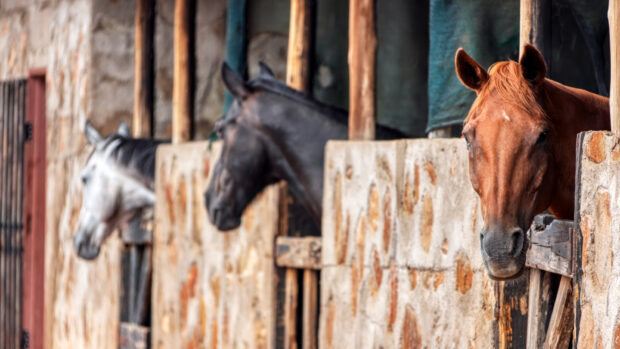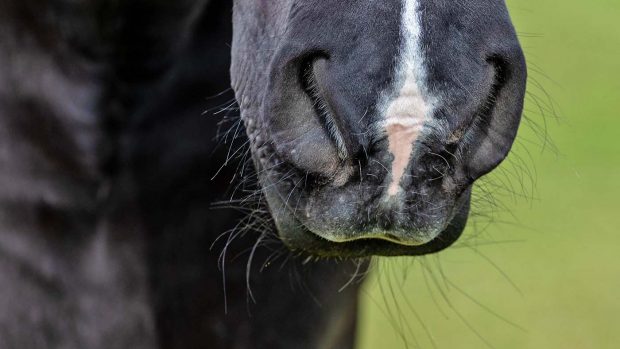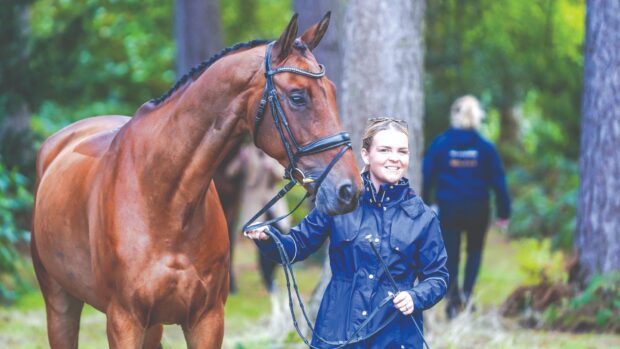TOP riders say the “nightmare” of crossing the Channel with horses since Brexit has to change, as they report hours of “pointless” delays.
H&H has spoken to world eventing gold medallist Gemma Tattersall and showjumper Elizabeth Baker, both of whom were held up for hours on recent trips to Europe. Gemma had to arrange for one of her horses to be collected owing to a mistake on the paperwork, which left her hundreds of pounds more out of pocket.
“This really needs to be sorted out; it’s a total nightmare,” Gemma told H&H. “I don’t understand why it has to take so long and it’s ridiculous, as it’s supposed to all be about horse welfare but they don’t even check the horses.”
Gemma said she allowed five hours extra when she left her base in Sussex at 1am for her ferry on 16 March, en route to a showjumping show in Belgium. She arrived at the pre-crossing office in Hythe, Kent, and took her carnets to be checked. Gemma had three documents; one that had about 10 horses named on it, one for the kit — “You have to list everything in the truck, from hoofpicks to the makes of your numnahs,” she explained — and a new one she had bought to list her home-bred, five-year-old Just A Jolly, who was on her first trip abroad.
“I asked the official to please watch me to make sure I’m filling it in correctly, and he said fine,” she said. “He checked, took them away and brought them back in 10 minutes. That can take an hour so I said, ‘Thank you very much’ and off I toddled, not knowing only two of them had been stamped.”
Gemma had to wait in a queue for two and a half hours for the next ferry, arriving in Calais at 9am local time. She took the carnets to be stamped, waited another hour and a half, then went in convoy to the yard where the vet checks are carried out, where she was told Jolly’s carnet had not been stamped. She was told she had to return to the UK, get it stamped and come back, with another £175 vet appointment on the way back.
By this time, the horses had been on the lorry for nine hours.
“At one point, I sat on the ramp and cried,” Gemma said. “I didn’t know what to do; the horses were in my care and I was terrified they’d get poorly, standing there so long.”
Turning down the offer of stables at €300 (£252) each and after many phone calls, Gemma spoke to her mother, who collected a lorry from Gemma’s and got a ferry to pick up Jolly, arriving home at about 4am.
Gemma, who left Calais at about 4.30pm, said the horses were fine and she had a good show, including Isabel Fox’s MGH Candy Girl being placed in her first ranking grand prix, but she wants to take the travel issues further. Not only is it far more expensive to travel horses abroad since Brexit, she said, the delays are putting horse welfare at risk.
“It’s not just us this happens to, it’s everyone,” she said. “Everyone I’ve spoken to has the same issue and no one seems to care. If it was legit and people cared about the stamp, or horse welfare, it would be different but it’s just bureaucracy and paperwork.
“It makes me incredibly sad that we cannot just go to these shows any more without a massive amount of cost and hassle; there are hardly any Brits at the shows now.
“I would like to think there could be a better system in place to cut down the hours added on, it is a genuine problem.”
On 29 March, it took Elizabeth Baker, who lives only 15 miles from Dover, over 10 hours to get clear of Calais on her way to a show.
She was delayed by queues at Dover and closed booking desks, which led to her missing her ferry and having to wait two hours for the next. She then had to wait for three hours for the vet at Calais.
“They have a board showing who’s coming in so they could be ready, but they choose to do it while you’re there, which takes as long as they want it to,” she told H&H. “We were waiting for them to check the paperwork and about an hour for the vet to check the horses, but he only opened the groom’s door, didn’t even put his head in the lorry but peered through and said, ‘Are there four?’ and that was it. He didn’t check anything and couldn’t even have seen what colour horses they were. In total, the horses were on board for 16 or 17 hours.”
Elizabeth questioned why all the checks are needed, as horses have to be seen 24 hours before departure by a vet, to check their health and papers.
“The whole purpose of a vet check is to check the health of the horses before their onward journey, not to keep them waiting for such long periods and actually degrade their welfare,” she said. “It’s beyond a joke. No paperwork should come before the welfare of our horses.”
A Defra spokesman told H&H: “We sympathise with owners who are understandably concerned for the welfare of their horses when travelling to the EU and continue to meet regularly with key industry stakeholders, and authorities in France and Ireland, on this issue.
“We have engaged extensively with the equine sector to make sure they’re ready for the changes which our exit from the EU brings and have always been clear there would be new processes for businesses and individuals to follow.
“A range of initiatives to aid smooth movement to EU countries has been introduced, including an increase in the number of certifiers to meet demand for export health certification.”
You might also be interested in:

‘It’s a mass of bureaucracy’: top horse vet shares frustration at ongoing Brexit transport issues

Carl Hester: urgent rewrite of Brexit rules needed to avoid welfare problems in Calais *H&H Plus*
Carl Hester discusses the issues involved in transporting horses post-Brexit

Work ongoing as Brexit delays spark horse welfare concerns

Subscribe to Horse & Hound magazine today – and enjoy unlimited website access all year round
Horse & Hound magazine, out every Thursday, is packed with all the latest news and reports, as well as interviews, specials, nostalgia, vet and training advice. Find how you can enjoy the magazine delivered to your door every week, plus options to upgrade your subscription to access our online service that brings you breaking news and reports as well as other benefits.




